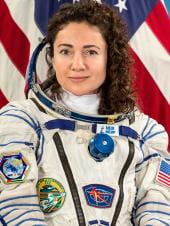Abstract
In this interview, Astronaut Jessica Meir, Brown University class of 1999, discusses her experiences as an undergraduate student at Brown, the steps she took to become a NASA Astronaut, and her life and work completing a mission on the International Space Station.
Meir begins by sharing her family background including her parents’ immigration to the United States from Israel and Sweden and her childhood in Caribou, Maine. She recalls learning about Brown from one of her father’s coworkers and reminisces about her first moments on campus. In speaking of her time at Brown, Meir remembers putting a lot of pressure on her academic performance, but also fondly details her experiences working at Miriam Hospital under a Rhode Island Space Grant and then participating in the Space Life Sciences Training Program through the NASA Kennedy Space Center.
Meir goes on to chronicle her journey to becoming a NASA astronaut. She elaborates on the astronaut application, interview, and selection process as well as the three application cycles it took for her to be accepted into the program. She recounts the moment she received the call that she had been selected as part of the class of 2013 and jumps ahead to similarly describe her first memories of entering the International Space Station in 2019. Additionally, Meir reflects on her experience as a member of the first all-women spacewalk and also shares some of her favorite and most challenging moments from her time living and working in space. Meir concludes by explaining how her mission changed her perspective of the world and reflecting on how Brown prepared her for such a successful career.
See also: Meir’s NASA biography
Recorded on October 27, 2020 via Zoom
Interviewed by Amanda Knox, Pembroke Center Assistant Archivist
Suggested Chicago style citation: Meir, Jessica. Interview. By Amanda Knox. Pembroke Center Oral History Project, Brown University. October 27, 2020.
Biography
Jessica U. Meir was born and raised in Caribou, Maine. After graduating from Caribou High School, Meir earned an AB in Biology from Brown University in 1999 and a Master of Science degree in Space Studies from International Space University in 2000. From 2000 to 2003, Meir worked for Lockheed Martin’s Human Research Facility (NASA Johnson Space Center) supporting human physiology research on the space shuttle and International Space Station. During this time, she also participated in research flights on NASA’s reduced gravity aircraft and served as an aquanaut crew member in the Aquarius underwater habitat for the 4th NASA Extreme Environment Mission Operations (NEEMO) mission. Meir went on to earn a Doctorate in Marine Biology (diving physiology) from Scripps Institution of Oceanography (UCSD) in 2009. During that time she studied the diving physiology of marine mammals and birds, focusing on oxygen depletion in diving emperor penguins (Antarctic field research) and elephant seals (northern California). She investigated the high‐flying bar-headed goose during her post‐doctoral research at the University of British Columbia, training geese to fly in a wind tunnel while obtaining various physiological measurements in reduced oxygen conditions.
In 2012, Dr. Meir accepted a position as Assistant Professor at the Harvard Medical School/Massachusetts General Hospital, where she continued her research on the physiology of animals in extreme environments. She also took part in Smithsonian Institution diving expeditions to the Antarctic and Belize, and has been very active with scientific outreach efforts. Meir was selected by NASA in 2013. She most recently served as flight engineer on the International Space Station for Expedition 61 and 62, during which she and Astronaut Christina Koch made history conducting the first all-women spacewalk in October 2019. When she is not working, Meir enjoys skiing, hiking, running, cycling, soccer and SCUBA diving. She is a private pilot and is conversational in Swedish and Russian.
